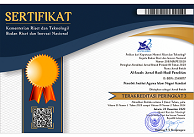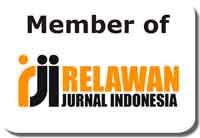Eksistensi Dakwah Bil Hikmah sebagai Akselerasi Pengembangan Sosial Keagamaan di Kecamatan Sukadana Lampung Timur
Abstract
Keywords
Full Text:
PDFReferences
Afrida, Afrida. “Hakikat Manusia dalam Perspektif Al-Qur`an.” Al-Qisthu: Jurnal Kajian Ilmu-ilmu Hukum 16, no. 2 (December 30, 2018): 54. doi:10.32694/010510.
Aliyudin, Aliyudin. “Prinsip-Prinsip Metode Dakwah Menurut Al-Quran.” Jurnal Ilmu Dakwah 5, no. 16 (November 29, 2014): 181. doi:10.15575/jid.v5i16.360.
Alsa, Asmadi. Penelitian Psikologi. II. Yogyakarta: Pustaka Pelajar Offset, 2004.
Departemen Agama RI, Departemen Agama RI. Al-Qur’an dan Terjemahnya. Jakarta, 2010.
Fatihah, Siti Rohmatul. “Konsep Etika dalam Dakwah” Jurnal Ilmu Dakwah 38, no. 2 (July 30, 2019): 241. doi:10.21580/jid.v38.2.3886.
Ghafur, Waryono Abdul. “Dakwah Bil-Hikmah di Era Informasi dan Globalisasi.” Jurnal Ilmu Dakwah 34 (2014): 23.
Iswati, Noormawanti. “Konsep Diri Seorang Da’i.” Jurnal Bimbingan Penyuluhan Islam 1, no. 2 (December 25, 2019): 207. doi:10.32332/jbpi.v1i2.1719.
Khasinah, Siti. “Hakikat Manusia Menurut Pandangan Islam dan Barat.” Jurnal Ilmiah Didaktika 13, no. 2 (February 1, 2013). doi:10.22373/jid.v13i2.480.
Nazirman, Nazirman. “Konsep Metode Dakwah Bil Hikmah dan Implementasinya dalam Tabligh.” Al-Hikmah: Jurnal Dakwah dan Ilmu Komunikasi, June 1, 2018, 31–41. doi:10.15548/al-hikmah.v0i0.91.
“Paradigma Interpretatif.Htm,” n.d.
Rasyid, Muhammad Makmun. “Islam Rahmatan Lil Alamin Perspektif KH. Hasyim Muzadi.” Epistemé: Jurnal Pengembangan Ilmu Keislaman 11, no. 1 (June 1, 2016): 93–116. doi:10.21274/epis.2016.11.1.93-116.
Razak, Yusran. Sosiologi Sebuah Pengantar: Tinjauan Pemikiran Sosiologi Perspektif Islam. Jakarta: Laboratoruim Sosiologi Agama, n.d.
Ridlwan, Nurma Ali. “Pendekatan Fenomenologi dalam Kajian Agama.” KOMUNIKA: Jurnal Dakwah dan Komunikasi 7, no. 2 (January 1, 1970). doi:10.24090/komunika.v7i2.385.
Rozikan, Muhamad. “Transformasi Dakwah Melalui Konseling Islami.” INJECT (Interdisciplinary Journal of Communication) 2, no. 1 (January 10, 2018): 77. doi:10.18326/inject.v2i1.77-98.
Salim, Agus. “Peran dan Fungsi Dai Dalam Perspektif Psikologi Dakwah.” AL-HIKMAH: Media Dakwah, Komunikasi, Sosial dan Budaya 8, no. 1 (April 22, 2018). doi:10.32505/hikmah.v8i1.401.
Sugiyono. Metode Penelitian Pendidikan; Pendekatan Kuantitatif, Kualitatif, Dan R&D. III. Bandung: Alfabeta, 2010.
Suratman, Junizar. “Pendekatan Penanfisran al-Qur’an yang Didasarkan pada Instrumen Riwayat, Nalar, dan Isyarat Batin.” Intizar 20, no. 1 (2014): 20.
Tari Budayanti Usop. “Kajian Literatur Metodologi Penelitian Fenomenologi dan Etnografi,” 2019. doi:10.13140/RG.2.2.15786.47044.
Widodo, Anton. “Urgensi Bimbingan Keagamaan Islam Terhadap Pembentukan Keimanan Mualaf.” Jurnal Bimbingan Penyuluhan Islam 1, no. 01 (July 2, 2019): 66. doi:10.32332/jbpi.v1i01.1476.
Zaenuri, Lalu Ahmad. “Eksistensi Da’i dalam Tilikan Al-Qur'an” 11, no. 2 (2014): 22.
DOI: http://dx.doi.org/10.31332/ai.v0i0.2166
Copyright (c) 2020 Anton Widodo, Nur Fauziah Fatawi, Andi Rahmad

This work is licensed under a Creative Commons Attribution-NonCommercial-ShareAlike 4.0 International License.










